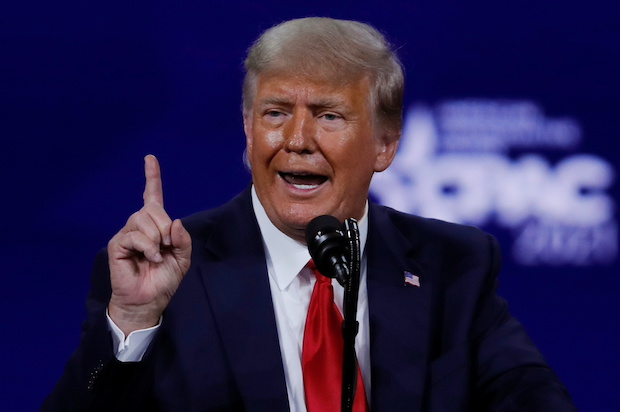
Former U.S. President Donald Trump speaks at the Conservative Political Action Conference (CPAC) in Orlando, Florida, U.S. Feb. 28, 2021. (File photo from REUTERS)
Facebook Inc’s oversight board on Wednesday upheld the company’s suspension of former U.S. President Donald Trump but gave the company six months to determine a “proportionate response” going forward, a verdict that may chart how social media will treat rule-breaking world leaders in the future.
The company inappropriately imposed an indeterminate suspension without clear standards, the board said, requiring a company review. The Board said Facebook should determine a response that is consistent with rules applied to other users of the platform.
“Facebook left the indefinite suspension in place and referred the entire matter to the Oversight Board, apparently hoping the board would do what it had not done,” said former federal judge Michael McConnell, co-chair of the Oversight Board, during a press conference after publishing its decision on Wednesday.
McConnell added, “Indefinite penalties of this sort, do not pass the international or American smell test for clarity, consistency, and transparency.”
READ: Facebook oversight board’s decision
Facebook indefinitely blocked Trump’s access to his Facebook and Instagram accounts over concerns of further violent unrest following the Jan. 6 storming of the U.S. Capitol by supporters of the former president.
“We will now consider the board’s decision and determine an action that is clear and proportionate,” Nick Clegg, Facebook vice president of global affairs and communication, published in a blog entry following the decision. “In the meantime, Mr. Trump’s accounts remain suspended.”
At the time of the suspension, Facebook Chief Executive Mark Zuckerberg said in a post that “the risks of allowing the President to continue to use our service during this period are simply too great.” The company later referred the case to its recently established board, which includes academics, lawyers and rights activists, to decide whether to uphold the ban or restore Trump.
The binding verdict marks a milestone for the board, which rules on a small slice of challenging content decisions and which Facebook created as an independent body as a response to criticism over how it handles problematic material.
Tech platforms have grappled in recent years with how to police world leaders and politicians that violate their guidelines. Facebook has come under fire both from those who think it should abandon its hands-off approach to political speech and those who saw the Trump ban as a worrying act of censorship.
“This is a sad day for America but a sadder (day) for the Facebooks of the world who have actually enjoyed a very wild, wild west kind of regulatory environment,” Mark Meadows, former White House chief of staff, said on Fox News after the decision. “It is time we break up Big Tech, not just regulate them.”
House minority leader Kevin McCarthy said in a tweet: “Facebook is more interested in acting like a Democrat Super PAC than a platform for free speech and open debate. If they can ban President Trump, all conservative voices could be next. A House Republican majority will rein in big tech power over our speech.”
Trump was permanently banned from Twitter Inc, where he has more than 88 million followers.
Trump, who has been sending out short, emailed press releases, continued to promote election misinformation in one on Monday, saying “the Fraudulent Presidential Election of 2020 will be, from this day forth, known as THE BIG LIE!”
On Tuesday, Trump launched a new web page to share messages that readers can then re-post to their Facebook or Twitter accounts. A senior adviser has said Trump also has plans to launch his own social media platform.
“Today’s decision shows that the Facebook Oversight Board experiment has failed,” said a group of academics, experts and Facebook critics known as the “Real Facebook Oversight Board.”
“This verdict is a desperate attempt to have it both ways, upholding the ‘ban’ of Donald Trump without actually banning him, while punting any real decisions back to Facebook.”